-
Categories
-
Pharmaceutical Intermediates
-
Active Pharmaceutical Ingredients
-
Food Additives
- Industrial Coatings
- Agrochemicals
- Dyes and Pigments
- Surfactant
- Flavors and Fragrances
- Chemical Reagents
- Catalyst and Auxiliary
- Natural Products
- Inorganic Chemistry
-
Organic Chemistry
-
Biochemical Engineering
- Analytical Chemistry
-
Cosmetic Ingredient
- Water Treatment Chemical
-
Pharmaceutical Intermediates
Promotion
ECHEMI Mall
Wholesale
Weekly Price
Exhibition
News
-
Trade Service
The latest research from Essen Huamai expects fossil fuel-based polyethylene production to peak after 2040
The Essence Huamai Plastics Recycling Service (CPS) team has fully considered various influencing factors to predict the future trend of plastic demand and supply.
The Essence Huamai Plastics Recycling Service (CPS) team has fully considered various influencing factors to predict the future trend of plastic demand and supply.
From now to 2050, global plastic demand will still grow at an average annual rate of 2.
"In the near future, plastic production will be decoupled from fossil fuels
Another benefit of focusing on recycling plastic waste is reducing reliance on virgin plastic produced from fossil fuels
In addition to building more plastic waste collection and recycling infrastructure, countries are using a variety of means to limit plastic consumption, including tightening the use of single-use plastic products and taxing virgin (and recycled) plastics
With changes in policy and market environment, the plastics industry will accelerate its transformation to a circular economy model, and the way and speed of its transformation will vary in different countries and regions
"If the overall demand trajectory for plastics does not decline significantly, there will be no peak in fossil fuel-based plastics production until 2043,
Global polyethylene demand is expected to grow at an average annual rate of 3% through 2050
Reducing reliance on virgin plastic produced using fossil fuels and eliminating waste plastic from entering global ecosystems is key to accelerating peak plastic production
If mechanical recycling of plastics develops, demand for fossil fuel-based plastics will peak in 2046; further development of chemical recycling will bring the peak demand forward to 2043
If we can simultaneously control plastic demand and accelerate the development of plastic recycling infrastructure, the peak of plastic production can be brought forward by 6-8 years
.
This will further increase the recycling rate of waste plastics and accelerate the realization of the vision of a circular economy
.
' said Waters
.







